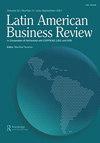The Home Country Institutional Environment as an Internationalization Driver for the Large Brazilian Pharmaceutical Companies
IF 0.7
Q3 Business, Management and Accounting
引用次数: 0
Abstract
AbstractThis study analyses the internationalization characteristics of Large Brazilian Pharmaceutical Companies. It contributes to the international business and evolutionary literature by showing how the home country institutional environment affects the firms’ internationalization at a country- and industry-level. The methodology is a multiple case study with eight companies, exploring their competitive advantages, strategies, and obstacles to international expansion. Findings reveal that home country institutional environment constraints pushed companies to build capabilities to survive and compete in the domestic market, which served as advantages when going international. Companies’ internationalization is driven by the exploitation and exploration of assets and capabilities.Keywords: Brazilemerging markets multinational enterprisehome country institutional environmentinternationalization driverspharmaceutical industryJEL CLASSIFICATION CODES: F23L65O32 Notes1 It only includes Brazilian residents-owned companies. It does not include foreign-owned companies based in Brazil.2 Firms classified in division 21 of CNAE. CNAE’s structure is based on the International Standard Industrial Classification of All Economic Activities (ISIC) of the United Nations Industrial Development Organization (UNIDO). The manufacture of pharmaceuticals is classified in section C, division 21 of ISIC, Rev.4.3 Exchange rate (31/12/2018): 1.00 US dollar = 3.87 Brazilian Real.4 According to the Brazilian Development Bank (BNDES, Citation2018) classification.5 Revenue from two of the sample companies is omitted for confidentiality reasons.6 It does not comprise revenue from two of the sample companies because of confidentiality reasons.7 Apex-Brazil is an entity governed by private law with a council formed by public bodies, created in 2003. The Agency promotes Brazilian products and services abroad through prospective and commercial missions, business roundtables, support for the participation of Brazilian companies in international fairs and developing sector-specific programs, among other functions. Abiquifi, founded in 1983, is a class association of the pharmaceutical sector that brings together pharmaceutical companies and producers of pharmaceutical raw materials (e.g. API). The Association undertakes actions aimed at developing the Brazilian pharmaceutical sector, such as the internationalisation project ‘Brazilian Pharma Solutions’, renamed in 2018 ‘Brazilian Pharma & Health’, in partnership with Apex-Brazil.8 In 2016, Anvisa became a member of the International Conference on Harmonization of Technical Requirements for Registration of Pharmaceuticals for Human Use (ICH), formed by the world's leading regulatory authorities, such as the FDA, EMA and Japan's Pharmaceuticals and Medical Devices Agency (PMDA). As a participant in the ICH working groups, Anvisa had 5 years (2016–2021) to adapt, within ICH’s guides—Pharmacovigilance, Clinical Research, implementation of the Common Technical Document (CTD) and the Medical Terminology Dictionary (MedDRA) vocabulary. Consequently, Anvisa needs to standardize its manuals according to the regulatory agencies of those countries (ANVISA, Citation2016).Additional informationFundingThis work was supported by the Coordination for the Improvement of Higher Education Personnel (CAPES) (Grant number 001), and the Ministry of Health through the National Council for Scientific and Technological Development (CNPq), as a partial result of the Project “Reflection of Brazilian Health Industrial and Technological Policies for Local Production and Supply of the Unified Health System (SUS)” (Grant number 41/2013).巴西大型制药公司国际化的母国制度环境
摘要本研究分析了巴西大型制药公司的国际化特征。它通过展示母国制度环境如何影响公司在国家和行业层面的国际化,为国际商业和进化文献做出了贡献。该方法是对八家公司的多个案例进行研究,探索他们的竞争优势、战略和国际扩张的障碍。研究发现,母国制度环境的约束促使企业建立在国内市场生存和竞争的能力,这是企业走向国际的优势。公司的国际化是由对资产和能力的开发和探索驱动的。关键词:巴西新兴市场跨国企业母国制度环境国际化驱动因素医药行业jel分类代码:F23L65O32注1仅包括巴西民营企业它不包括总部设在巴西的外资公司。2 . CNAE第21部门的公司。CNAE的结构基于联合国工业发展组织(UNIDO)的所有经济活动国际标准工业分类(ISIC)。根据巴西开发银行(BNDES, Citation2018)的分类,汇率(2018年12月31日):1.00美元= 3.87巴西雷亚尔出于保密原因,其中两家样本公司的收入被省略由于保密原因,它不包括两个样本公司的收入apex -巴西是一个由私法管辖的实体,由公共机构组成委员会,成立于2003年。该机构通过前瞻性和商业代表团、商业圆桌会议、支持巴西公司参加国际博览会和制定部门特定计划等职能,在国外推广巴西产品和服务。Abiquifi成立于1983年,是制药行业的一个行业协会,汇集了制药公司和医药原料(如原料药)生产商。该协会与apex - brazil合作开展旨在发展巴西制药行业的行动,例如国际化项目“巴西制药解决方案”,于2018年更名为“巴西制药与健康”2016年,安维泽成为人用药品注册技术要求国际协调会议(ICH)的成员,该会议由FDA、EMA和日本药品和医疗器械厅(PMDA)等世界领先的监管机构组成。作为ICH工作组的参与者,Anvisa有5年(2016-2021)的时间来适应ICH指南——药物警戒、临床研究、通用技术文件(CTD)和医学术语词典(MedDRA)词汇的实施。因此,Anvisa需要根据这些国家的监管机构规范其手册(Anvisa, Citation2016)。这项工作得到了高等教育人员改善协调(CAPES)(批准号001)和卫生部通过国家科学和技术发展委员会(CNPq)的支持,作为“巴西卫生工业和技术政策对统一卫生系统(SUS)本地生产和供应的反思”项目(批准号41/2013)的部分结果。
本文章由计算机程序翻译,如有差异,请以英文原文为准。
求助全文
约1分钟内获得全文
求助全文
来源期刊

Latin American Business Review
Business, Management and Accounting-Business and International Management
CiteScore
2.40
自引率
0.00%
发文量
6
期刊介绍:
Latin American Business Review is a quarterly, refereed journal which facilitates the exchange of information and new ideas between academics, business practitioners, public policymakers, and those in the international development community. Special features of the journal will keep you current on various teaching, research, and information sources. These activities all focus on the business and economic environment of the diverse and dynamic countries of the Americas.
 求助内容:
求助内容: 应助结果提醒方式:
应助结果提醒方式:


